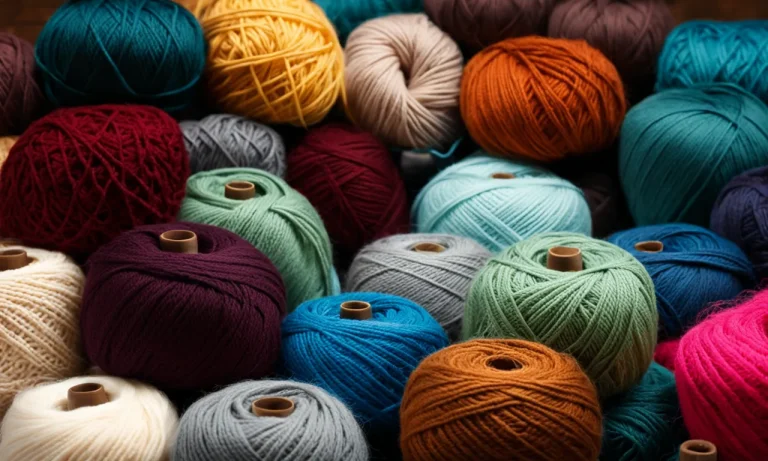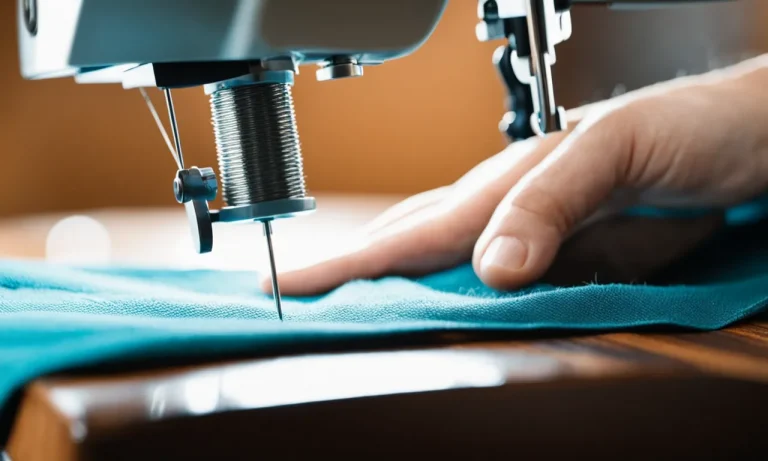Is Fabric Softener Bad For Your Skin?
Fabric softener is a popular laundry product that helps make clothes feel softer and smell fresher after washing. But some people wonder if frequently using fabric softener could be harmful to skin over time.
In this comprehensive guide, we’ll examine the potential effects of fabric softener on skin so you can decide if it’s safe to keep using this laundry staple.
If you’re short on time, here’s a quick answer to your question: Fabric softener is generally considered safe for most people’s skin when used as directed. However, some of the chemicals in fabric softeners may cause irritation or allergic reactions in those with sensitive skin.
How Fabric Softeners Work
Fabric softeners are commonly used in laundry to make clothes feel softer and reduce static cling. But have you ever wondered how they actually work? Let’s dive into the science behind fabric softeners and explore their mechanism of action.
Coats fabrics with cationic (positively charged) surfactants
One of the key ingredients in fabric softeners is cationic surfactants. These surfactants have a positive charge, which helps them bond to negatively charged fabrics. When you add fabric softener to your laundry, these cationic surfactants coat the fibers of your clothes, creating a thin layer.
This layer helps to smooth out the fabric, making it feel softer to the touch. It also helps to reduce the friction between the fibers, preventing them from rubbing against each other and causing static cling.
So, the next time you put on a freshly washed and softened shirt, you can thank these cationic surfactants for their role in making it feel great!
Leaves a lubricating layer that reduces friction
Another way fabric softeners work is by leaving behind a lubricating layer on your clothes. This layer acts as a barrier, reducing friction between the fabric and your skin. As a result, you experience less irritation and discomfort when wearing clothes that have been treated with fabric softener.
By reducing friction, fabric softeners can also help to extend the life of your clothes. The less friction there is between the fibers, the less likely they are to wear out or develop pilling. So, using fabric softener can actually help your clothes stay in better condition for longer.
Contains fragrance to give clothes a pleasant scent
Aside from making your clothes softer and reducing friction, fabric softeners often contain fragrances to give your laundry a pleasant scent. These fragrances can range from floral and fruity to more subtle and clean scents.
When added to the rinse cycle, the fragrance is released and imparts a fresh smell to your clothes.
It’s important to note that some people may be sensitive to these fragrances, experiencing skin irritation or allergies. If you have sensitive skin, it’s a good idea to opt for fragrance-free fabric softeners or try using natural alternatives, such as vinegar or baking soda, which can also help soften clothes.
Now that you know how fabric softeners work, you can make an informed decision about whether or not to use them in your laundry routine. Remember, there are alternatives available if you prefer to avoid fabric softeners altogether. Ultimately, it’s about finding what works best for you and your skin!
Potential Skin Irritants in Fabric Softener
Fabric softeners are commonly used to make clothes feel softer and to reduce static cling. However, some people may experience skin irritation when using fabric softener. This can be attributed to certain ingredients found in fabric softeners that have the potential to irritate the skin.
Fragrances
One of the main culprits for skin irritation in fabric softeners is fragrances. Many fabric softeners contain artificial fragrances that can be irritating to sensitive skin. These fragrances are made up of various chemicals, and some individuals may have an allergic reaction or sensitivity to specific fragrance ingredients.
Fragrance chemicals are known to be one of the most common causes of allergic contact dermatitis, a condition characterized by redness, itching, and inflammation of the skin. It is essential to note that not all fragrances cause skin irritation, and some individuals may be more sensitive than others.
Quaternary ammonium compounds
Quaternary ammonium compounds, also known as quats, are another group of ingredients commonly found in fabric softeners. These compounds help to reduce static cling and make clothes feel softer. However, they can also be irritating to the skin, especially in high concentrations.
Some studies have shown that quats can cause skin irritation and dermatitis in individuals with sensitive skin. It is important to note that the concentration of quats in fabric softeners can vary, and some products may contain higher levels than others.
Therefore, it is advisable to check the ingredient list and choose fabric softeners with lower concentrations of quats if you have sensitive skin.
Phthalates
Phthalates are a group of chemicals used in many household products, including fabric softeners. They are primarily used to enhance the fragrance and make it last longer. Some studies suggest that certain phthalates may have the potential to disrupt hormone function and may be linked to skin sensitization.
While the evidence regarding the effects of phthalates on skin health is not conclusive, it is advisable to choose fabric softeners that are labeled as phthalate-free if you have concerns about potential skin irritation.
It is important to remember that not everyone will experience skin irritation from fabric softeners. Some individuals may have no issues, while others may develop allergic reactions or sensitivities. If you notice any signs of skin irritation after using fabric softener, it is best to discontinue use and consult a dermatologist for further guidance.
For more information on the potential skin irritants in fabric softeners, you can visit websites such as Environmental Working Group (EWG) or National Center for Biotechnology Information (NCBI).
Research on Fabric Softener and Skin
When it comes to the impact of fabric softener on our skin, there is limited evidence to suggest that it causes widespread issues. While fabric softeners are designed to make our clothes feel softer and smell pleasant, it is important to consider the potential effects they may have on our skin.
Limited evidence it causes widespread issues
According to studies conducted by dermatologists, there is no conclusive evidence to suggest that fabric softener directly causes widespread skin problems. However, it is important to note that some people may experience skin irritations or allergic reactions when using fabric softener.
These reactions are more prevalent in individuals with pre-existing skin sensitivities or conditions such as eczema or psoriasis.
It is worth mentioning that fabric softeners contain various chemicals, such as fragrances and preservatives, which can potentially irritate the skin. However, the concentration of these chemicals is typically low, and most people do not experience any adverse effects.
If you have sensitive skin, it may be beneficial to choose fragrance-free or hypoallergenic fabric softeners.
May trigger reactions in those with skin sensitivities
For individuals with skin sensitivities, fabric softeners may indeed trigger reactions. It is essential to identify any potential triggers and avoid using products that may exacerbate these issues. If you notice any redness, itching, or rash after using fabric softener, it is advisable to discontinue its use and consult a dermatologist for further guidance.
Moreover, it is recommended to conduct a patch test before using a new fabric softener. Simply apply a small amount of the product on a small area of your skin and wait for 24-48 hours to observe any adverse reactions. This simple precautionary step can help prevent potential skin irritations.
More research needed on long-term effects
While the current evidence does not indicate significant long-term effects of fabric softener on the skin, further research is needed to fully understand its potential impact. Studies exploring the long-term effects of fabric softener and its chemical components on the skin are still limited.
In the meantime, it is essential to be mindful of your skin’s sensitivity and choose products that are suitable for your specific needs. If you are concerned about the potential effects of fabric softener on your skin, consider exploring alternative options such as natural fabric softeners or skipping the use of fabric softener altogether.
For more information on fabric softener and its impact on skin, you can visit https://www.ncbi.nlm.nih.gov/pmc/articles/PMC2755243/.
Tips for Safe Use of Fabric Softener
Don’t overuse – follow dosage on bottle
When it comes to using fabric softener, it’s important to remember that a little goes a long way. Overusing fabric softener can lead to a buildup of chemicals on your clothes, which can then transfer to your skin. To avoid this, always follow the recommended dosage on the bottle.
By using the correct amount, you can still enjoy the benefits of fabric softener without risking any negative effects on your skin.
Consider fragrance-free or organic formulas
Many fabric softeners on the market contain fragrances that can be irritating to sensitive skin. If you find that your skin reacts negatively to scented fabric softeners, consider switching to fragrance-free formulas.
These are specifically designed to be gentle on the skin and can reduce the risk of irritation. Alternatively, you can opt for organic fabric softeners that are made with natural ingredients, ensuring a safer and more skin-friendly option.
Rinse clothes thoroughly after washing
After using fabric softener, it’s important to rinse your clothes thoroughly during the washing cycle. This will help remove any residual chemicals that may have been left behind. By ensuring your clothes are properly rinsed, you can minimize the contact your skin has with potential irritants, reducing the risk of skin reactions.
Remember, a thorough rinse after using fabric softener is an essential step in keeping your skin healthy.
Try alternatives like white vinegar or wool dryer balls
If you’re concerned about the potential effects of fabric softener on your skin, there are alternative options you can try. White vinegar, for example, can be used as a natural fabric softener. Simply add a small amount to the rinse cycle of your washing machine.
Another option is using wool dryer balls, which can help soften clothes and reduce static without the need for fabric softener. These alternatives are often gentler on the skin and can be a great option for those with sensitive skin.
Conclusion
While the pleasing scents and soft feel of fabric softener are certainly tempting, it’s wise to be mindful of how often you use these products. Moderation is key, especially if you have sensitive skin or known fragrance allergies.
Following dosage guidelines, choosing safer formulas, and thoroughly rinsing clothes can help minimize any risks of skin irritation. With some careful precautions, you can continue enjoying soft, sweet-smelling laundry without harming your skin.







